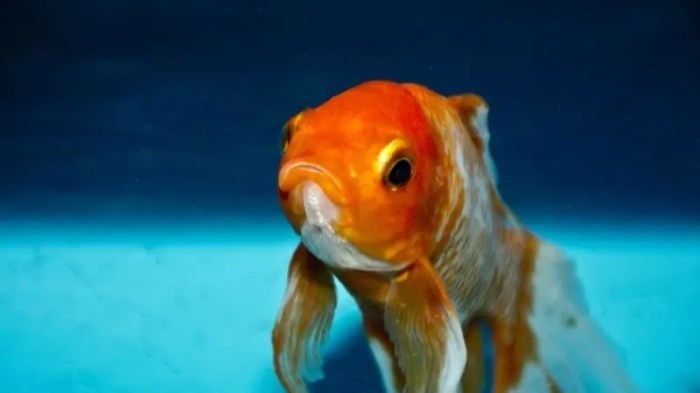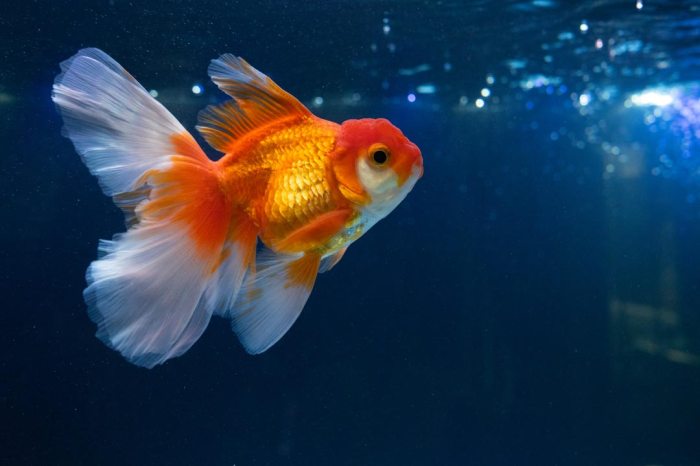Can goldfish survive in saltwater? The question, while seemingly straightforward, delves into the fascinating world of fish physiology and the delicate balance of their environments. Goldfish, beloved for their vibrant colors and graceful movements, are native to freshwater habitats, where their bodies have evolved to thrive.
However, when exposed to the harsh conditions of saltwater, their delicate systems face a formidable challenge.
Saltwater, with its high salt concentration, presents a significant osmotic pressure difference compared to the goldfish’s internal environment. This difference forces water to flow out of the fish’s body, leading to dehydration and potentially fatal consequences. The effects of saltwater exposure can be devastating, ranging from gill damage and organ failure to a slow and agonizing death.
Goldfish Biology and Habitat
Goldfish, a popular aquarium pet, are fascinating creatures with a unique biology and natural habitat. Understanding their physiological adaptations and the environmental conditions they thrive in is crucial for ensuring their well-being.
Natural Habitat and Water Salinity, Can goldfish survive in saltwater
Goldfish are native to East Asia, specifically China and Japan. Their natural habitat consists of freshwater lakes, ponds, and slow-moving rivers. The water in these environments is characterized by low salinity levels, typically less than 0.5 parts per thousand (ppt).
This means that the concentration of dissolved salts in freshwater is significantly lower than in saltwater environments.
Physiological Adaptations to Freshwater
Goldfish have evolved specific physiological adaptations to survive in freshwater environments. These adaptations primarily focus on maintaining a balance between the water content within their bodies and the surrounding environment.
Osmotic Pressure
Osmotic pressure refers to the pressure that needs to be applied to a solution to prevent the inward flow of water across a semipermeable membrane. In freshwater environments, the osmotic pressure of the surrounding water is lower than that of the goldfish’s body fluids.
This means that water tends to flow into the goldfish’s body through osmosis. To counteract this influx of water, goldfish have developed several adaptations:
- Dilute Urine Production:Goldfish produce large volumes of dilute urine to eliminate excess water from their bodies.
- Specialized Gills:Their gills have a high surface area and specialized cells that actively pump out excess water, preventing them from becoming waterlogged.
- Low Salt Concentration in Body Fluids:Goldfish maintain a lower salt concentration in their body fluids compared to saltwater fish, which helps to minimize the osmotic pressure difference between their internal environment and the freshwater surrounding them.
Osmotic Pressure: Freshwater vs. Saltwater
The osmotic pressure difference between freshwater and saltwater is a key factor that determines the survival of fish in these environments.
While goldfish are freshwater fish, they can’t survive in saltwater due to the high salinity. Their bodies aren’t equipped to handle the osmotic pressure difference, which can lead to dehydration and organ damage. However, you might be wondering about the safety of tap water.
Can goldfish survive in tap water ? The answer is often yes, but only after it’s been treated to remove chlorine and chloramines, which are toxic to fish. Ultimately, providing your goldfish with the right environment is crucial for their well-being, whether it’s a freshwater tank or a saltwater aquarium.
Freshwater has a lower osmotic pressure than saltwater, meaning it has a lower concentration of dissolved salts.
Saltwater fish, on the other hand, have evolved to live in environments with high osmotic pressure. They have adaptations to conserve water and excrete excess salt, ensuring a balance between their internal environment and the surrounding saltwater. For example, saltwater fish have specialized gills that actively pump out excess salt, while freshwater fish have gills that actively absorb salt.
This difference in osmotic pressure makes it impossible for goldfish to survive in saltwater environments.
Saltwater Exposure and Goldfish

Goldfish, native to freshwater environments, are ill-equipped to survive in saltwater. Their physiological adaptations are specifically designed for freshwater conditions, making them highly susceptible to the detrimental effects of salinity changes. Exposure to saltwater can lead to a range of physiological stress responses and health issues, ultimately impacting their survival.
Physiological Stress Responses to Salinity Changes
The sudden introduction of goldfish to saltwater triggers a cascade of physiological stress responses. The osmotic imbalance between the goldfish’s internal environment and the surrounding saltwater creates a significant challenge for their bodies.
Goldfish are osmoregulators, meaning they actively maintain a stable internal salt concentration. In freshwater, they constantly excrete excess water and absorb salts to maintain this balance.
In saltwater, however, the reverse occurs. The high salt concentration in the surrounding water draws water out of the goldfish’s body, leading to dehydration. To compensate, the goldfish attempt to conserve water and excrete excess salt. This can strain their kidneys and other organs, causing further complications.
Impacts of Saltwater on Goldfish Health
The physiological stress caused by saltwater exposure can manifest in several ways, significantly impacting the health and survival of goldfish.
Gill Damage
Saltwater exposure can lead to damage to the delicate gills of goldfish. The high salt concentration can cause the gills to swell and become inflamed, impairing their ability to absorb oxygen and filter waste. This can lead to respiratory distress and even suffocation.
Dehydration
The osmotic imbalance between the goldfish’s body fluids and the saltwater environment results in water loss. This dehydration can lead to organ dysfunction, lethargy, and ultimately, death.
Organ Failure
The physiological stress of saltwater exposure can strain the kidneys, liver, and other organs. These organs work overtime to maintain fluid balance and excrete excess salt, eventually leading to organ failure.
While goldfish are freshwater fish, their ability to adapt to different conditions can be surprising. While they won’t thrive in saltwater, can goldfish survive in cold water , making them a relatively low-maintenance pet. However, their tolerance for saltwater is far more limited, as their delicate internal systems are unable to handle the osmotic pressure changes.
Other Health Issues
Saltwater exposure can also contribute to other health issues in goldfish, including:
- Skin irritation
- Eye damage
- Increased susceptibility to infections
It is crucial to remember that goldfish are adapted to freshwater environments and cannot tolerate the high salt concentrations found in saltwater. Any exposure to saltwater can have severe consequences for their health and survival.
Saltwater Tolerance in Goldfish

Goldfish, despite their name, are not naturally adapted to saltwater environments. Their bodies are specifically designed for freshwater conditions, and their physiological processes are finely tuned to maintain osmotic balance in freshwater. This means that their bodies are equipped to deal with a lower concentration of salt in their surroundings compared to the concentration of salt inside their cells.
When exposed to saltwater, their delicate equilibrium is disrupted, leading to potentially life-threatening consequences.
Saltwater Exposure and Goldfish Physiology
The primary challenge goldfish face in saltwater is maintaining osmotic balance. Osmosis is the natural movement of water across a semi-permeable membrane from a region of high water concentration to a region of low water concentration. In freshwater, the concentration of salt inside a goldfish’s cells is higher than in the surrounding water.
This leads to water moving into the goldfish’s body, which it can handle through specialized mechanisms like urine production. However, in saltwater, the situation is reversed. The concentration of salt in the surrounding water is higher than inside the goldfish’s cells.
This causes water to move out of the goldfish’s body and into the surrounding water. The resulting dehydration can lead to various health issues, including:
- Cell shrinkage:As water moves out of the cells, they shrink, impacting their normal functions.
- Electrolyte imbalance:The loss of water also leads to a disruption in the balance of electrolytes, which are essential for various bodily functions.
- Kidney dysfunction:The kidneys, responsible for regulating water balance, struggle to cope with the constant water loss, leading to potential organ damage.
- Organ failure:If the osmotic imbalance is not addressed, it can lead to multiple organ failures and ultimately death.
Survival Rates of Goldfish in Saltwater
Scientific studies have consistently demonstrated the limited tolerance of goldfish to saltwater. The survival rates of goldfish in saltwater are significantly lower than in freshwater, and the time they can survive depends on the concentration of salt in the water.
For instance, in a study published in the Journal of Fish Biology, researchers found that goldfish exposed to a 10 ppt (parts per thousand) salinity solution had a survival rate of only 20% after 24 hours. The survival rate dropped to 0% after 48 hours.
This demonstrates the rapid decline in goldfish survival as the salinity increases.
Survival Times of Goldfish in Different Saltwater Concentrations
The following table provides a general overview of the survival times of goldfish in different saltwater concentrations:
| Saltwater Concentration (ppt) | Survival Time (hours) |
|---|---|
| 0 (Freshwater) | Indefinite |
| 5 | 24-48 |
| 10 | 12-24 |
| 15 | 6-12 |
| 20 | < 6 |
Note: These survival times are estimates and can vary based on factors such as the size and health of the goldfish, water temperature, and other environmental conditions.
Ethical Considerations
Intentionally exposing goldfish to saltwater raises significant ethical concerns, as it directly contradicts their natural habitat and physiological needs. Such actions can be considered animal cruelty, impacting their well-being and potentially leading to suffering. This section explores the ethical implications of subjecting goldfish to an environment they are not adapted for.
Animal Cruelty
Subjecting goldfish to saltwater environments can be categorized as animal cruelty due to the potential for significant harm and suffering. Goldfish are freshwater fish, and their bodies are specifically designed to thrive in freshwater environments. They lack the physiological adaptations necessary to survive in saltwater, which poses a serious threat to their health and well-being.
- Osmotic Stress:Goldfish lack the ability to regulate their internal salt balance in saltwater. This leads to osmotic stress, where water is drawn out of their bodies, causing dehydration, organ damage, and ultimately, death.
- Gill Damage:Saltwater can damage goldfish gills, interfering with their ability to breathe and absorb oxygen. This can lead to respiratory distress, lethargy, and eventual suffocation.
- Stress and Distress:Being placed in a saltwater environment creates significant stress for goldfish. This can manifest in behaviors like frantic swimming, hiding, and loss of appetite.
“Intentionally exposing goldfish to saltwater is a form of animal cruelty. It violates their natural needs and can cause severe suffering.”
Responsible Pet Ownership
Responsible pet ownership encompasses providing a suitable environment that meets the specific needs of the animal. For goldfish, this means maintaining a freshwater aquarium with appropriate water parameters, including temperature, pH, and dissolved oxygen levels. Providing a suitable habitat ensures the goldfish’s well-being and prevents unnecessary stress or suffering.
- Aquarium Setup:A properly sized aquarium with a filtration system and regular water changes is crucial for maintaining a healthy environment for goldfish.
- Water Quality:Monitoring water parameters like temperature, pH, and ammonia levels ensures the water is safe and suitable for goldfish.
- Diet:Providing a balanced diet of high-quality goldfish food contributes to their overall health and well-being.
Final Conclusion: Can Goldfish Survive In Saltwater
While the allure of seeing a goldfish thrive in saltwater may be tempting, the scientific evidence paints a clear picture: goldfish are not equipped to survive in such conditions. Their delicate physiological makeup is adapted for freshwater, and exposing them to saltwater is akin to placing them in a hostile environment.
Responsible pet ownership dictates providing appropriate living conditions for goldfish, ensuring their well-being and longevity. The fascination with goldfish’s resilience may lead to curiosity, but understanding their limitations is crucial for their survival.